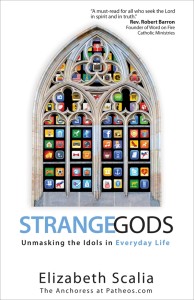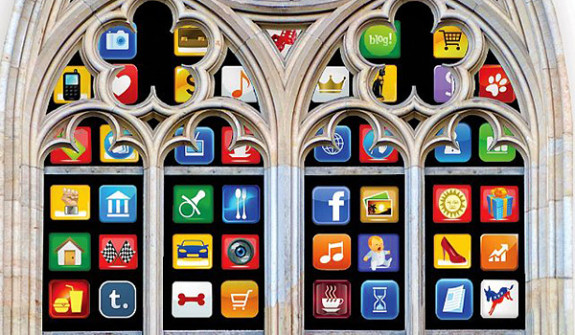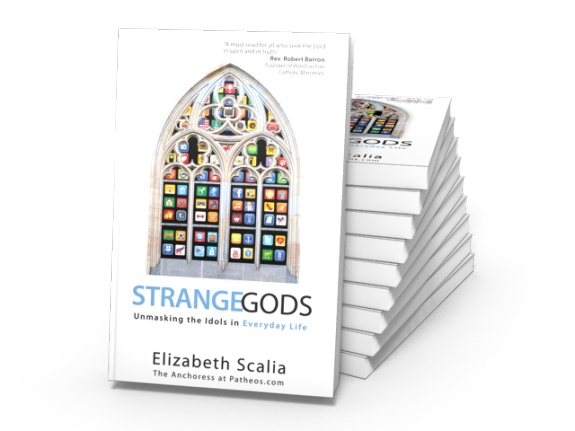When you hear “idol”, what’s the first thing that comes to mind? Probably a golden statue of a pagan god, or large temples, ancient and forgotten. Yet these all seem thousands of years and leaps of progress away. People don’t really worship idols any more, right?
 Wrong, according to Elizabeth Scalia‘s new book, Strange Gods: Unmasking the Idols in Everyday Life (Ave Maria, 2013).
Wrong, according to Elizabeth Scalia‘s new book, Strange Gods: Unmasking the Idols in Everyday Life (Ave Maria, 2013).
The book explores many idols that enslave and ensare us, false gods that are more familiar than we first think. Each day we devote ourselves to glowing iPhones and charismatic leaders, well-crafted plans and the allure of popularity. We obsessively chase friendships, approval, and comfort while reserving most of our attention for that greatest idol of all: ourselves. To paraphrase Flannery O’Connor, the idol we favor may be our own.
Yet according to Elizabeth, who runs the Patheos Catholic channel and blogs as The Anchoress, we can uproot these idols if we first learn to recognize them.
The book is somewhat troubling because it convicts you page after page, revealing undiscovered idols scattered throughout your life. But it ultimately inspires by showing how to defeat these vices. After finishing the book, I wrote:
“Today, there are many ‘Caesars’ who demand your allegiance: technology, money, sex, and power. So how can we resist? Elizabeth Scalia shows the way in Strange Gods, a clear, intelligent guide for those radicals who want to subvert these false lords and bow to the one true God.”
Elizabeth recently sat down with me to discuss her new book, and how to turn from the idols we unknowingly worship.
BRANDON: Strange Gods is all about idols, so let’s begin with a basic question. How do you define “idols”, and why are they dangerous?
ELIZABETH SCALIA: I’ve come to realize, first by watching our political processes and then really internalizing what I’d been observing, and praying about it quite a lot, that the idol—the “Strange God” that the First Commandment warns us about—is about the priorities we put ahead of God in our lives, but it’s also a literal access-blocker. Often when discussing this, I use the analogy of a mantle: imagine God on one side of it, and me on another, and on the mantle itself, all of the shiny trophies and framed images that reflect me—my values, my loves—back to me. They are literally placed “before” God; between God and myself. God’s on the other side and I’ve erected a barrier.
 Even if the things I have put between God and me are “good” things (love, family, the evidence of his gifts to me) I have nevertheless created a kind of blockade and forfeited (or enormously filtered) the direct line between God and my soul. I’ve necessitated detours, and curves, and winding roads that might still get me to God (or allow him to get to me) but with the added risk of distractions, vulnerabilities. If I do not have an awareness that this is what I’m doing, then I am capable of really crowding that mantle, really creating meandering, convoluted routes to God that make him seem less accessible, and make the effort to have a relationship with God seem that much more difficult, challenging and belabored. Too much like hard work.
Even if the things I have put between God and me are “good” things (love, family, the evidence of his gifts to me) I have nevertheless created a kind of blockade and forfeited (or enormously filtered) the direct line between God and my soul. I’ve necessitated detours, and curves, and winding roads that might still get me to God (or allow him to get to me) but with the added risk of distractions, vulnerabilities. If I do not have an awareness that this is what I’m doing, then I am capable of really crowding that mantle, really creating meandering, convoluted routes to God that make him seem less accessible, and make the effort to have a relationship with God seem that much more difficult, challenging and belabored. Too much like hard work.
And when that becomes so, one gives up. So, the danger of idolatry is that it not only makes God harder to communicate with, it makes us feel like it’s not worth the outlay of effort and not really necessary, anyway. Because look at all that shiny stuff we love, right there, before our eyes, having such primacy in our minds.
BRANDON: In the book you examine a litany of idols—money, sex, coolness, control, technology, ourselves. Of all the idols you probe, which are the most subtle and unnoticed?
ELIZABETH SCALIA: The more I think about it, the more convinced I am that the most insidious idol before us, because it seems so benign, is the zeitgeist—the times and trends to which we are so responsive, and into which we are so easily sucked. When we are over-attentive to what is “the latest thing”, and feeling a “need” to respond to it—whether it be fashion, current social or political thought, the headlines, the hottest vacation spot—we are putting all of our attention into outward prompts and the moment. We become a member of what comedian Flip Wilson used to call “The Church of What’s Happening Now,” which is a church of the passing moment, and a church of dissatisfaction, because it is about the temporary, the new, the “next thing coming down the pike” and it has no truck with Eternity. When we are constantly on the lookout for the latest, hippest thing/idea/mode, and we’re busily adapting ourselves to it, we cannot be looking at God. And it all seems so innocent and benign, too. We don’t consciously decide to put times and trends before God (and we do have to keep abreast of things, right?) but we become completely caught up in the world.
The worst part of this idol is that we train our children to worship it from a very young age. In our rush to make sure our children have the latest i-this and designer-that—that they’ve seen the latest big concert or movie, had their parties at the hottest venue—we push them into the pews of The Church of What’s Happening Now and we teach them to bow down and learn its ways. And we start teaching them their prostrations to the zeitgeist at a really young age. When parents complain that they feel like they’ve lost their kids to the pop-culture and to the values of the world, they need to realize that in some respects—and without intending to—we’ve helped them get lost, and helped make God more difficult to find.
Finally, while we serve up the zeitgeist to our kids every day, we too often serve up God in the 45 minute CCD class and maybe Mass on Sunday. “The World” 24/7 vs God-and-Church for perhaps two hours a week? It’s a set-up for defeat.
BRANDON: You dedicate many pages to social media and technology. Why is the Internet especially conducive to idolatry?
ELIZABETH SCALIA: Oh, boy. Because I work online, I think about this almost everyday. The word idol begins with “I” and it’s helpful to remember that the foundation of idolatry is always about the Ideas in our heads and big I of the ego. Our ideas are us at our inmost lever, and we delight in nothing more than seeing ourselves reflected back at ourselves, which is the whole purpose of the idol. When the ancient Israelites created their Golden Calf, they were feeling frustrated. Homeless, weak, and uncertain of what they were becoming, they erected a symbol of their idea of themselves, as they wished to be: strong, purposeful, known; they polished it up and raised it and what did it do: it reflected them back to themselves upon its highly-burnished surface.
That’s what the idol does: it encourages you to build on your ideas (because, Gregory of Nyssa wrote, it is our ideas that lead to idols) and raise them up for the admiration and validation of others. And this is kind of the internet in a nutshell, particularly social media: a series of echo-chambers where one finds others to agree with, and then the self-validation takes off. I know this intimately because, having blogged for nearly ten years, I’ve lived it. I’m certainly an idolator and that’s become something I bring into confession. Interestingly, the first time I did so, the priest said no one had ever confessed to it before. We think of idolatry of the Golden Calf. It is that, still. It just looks different, now. We build and erect it differently.
BRANDON: In the book, you admit, “I am a great idolater and have been all of my life.” If you don’t mind, which idols have plagued you the most?
ELIZABETH SCALIA: I had a fairly good Catholic “cultural” upbringing but even so have been points in my life where ideas dragged me apart from God; there was a point where I explored New Age ideas, which are just idol-loaded because they’re founded on self and self-ness and self-actualization and oh, boy, they can quickly lead you into dark places because they play on our free will, which both allows and inclines us to serve ourselves and then make excuses or rationalize away, or blame someone else…all of which has been our pattern since Eden, hasn’t it? So, there was a period there, where I was really lost, because the more I bought into this, the further I got from God, and even from love of my family, because my idea of love was changed.
I am forever grateful to the church bells that one afternoon called out as I drove by a local parish. On a whim, because I liked the bells, I thought I would stop in, and make an “old fashioned visitation”. It turns out I walked in on Adoration—something I had not seen in perhaps 20 years—and instantly hit the knees in awe. I stayed there in prayer for what I thought was five minutes, but in fact was an hour, and when I arose, everything was different. I feel like I got a “reset” a do-over. God is Good.
I still struggle with idols, and will everyday of my life, as do we all. Sometimes the idol of memory grabs me, and I find myself wallowing in self-pity over previous wounds (and yes, we can make an idol of our hurts; define ourselves by them, and never able move beyond them or forgive, which means we can’t get to God fully…) Or the idol of food, which is a hard one to admit it; I’ve self-medicated in that way all my life, and it’s very difficult. Like Saint Paul, who asked for deliverance from his “thorn in the flesh” I keep asking God to deliver me from that one, but then doing my own part becomes difficult and I can never tell if he’s saying “my grace is enough for you” or if I am just weak and disobedient. Possibly all of it. I’d probably be completely insufferable if I were thin!
And then the idol of the internet, as I discussed above. It is so easy to slip into the “look at me, agree with me, notice me” nonsense, particularly in social media…and I am particularly susceptible to it because basically if I am awake I am working and so much of that means begin online.
Sometimes guilt even becomes an idol. I remember my sins, my really grievous sins, and I get myself all worked up in regret; imagining that God couldn’t possibly forgive me. This is an idea that becomes an idol and it’s the devil’s own work because it gets us doubting in God’s mercy and believing that God is no greater than us, and our puny understanding. When I get to that place, I try to remind myself of the promise in Isaiah: “You have saved me from the pit of destruction, when you cast behind your back, all of my sins.” (Isaiah 38-17) To not believe in God’s mercy is to set your guilt and your own judgement before God’s.
BRANDON: Even after we recognize the idols that block our relationship to God, it’s still difficult to turn away. What advice would you give people on how to reject false idols?
ELIZABETH SCALIA: Awareness is the first step, right? Once we become aware of our tendency to create strange gods and put them before the Almighty, we can at least stop ourselves in our tracks (or ask for help, there) before we get too carried away. Regularly including a thorough exploration of the question in our examen—”Have I put anything before God, and in what ways?”—really helps because it not only informs our conscience but it helps us to see where we’ve blown it with the other commandments as well. I say in Strange Gods that the First Commandment is FIRST because it is intended to save us from ourselves; if we’re getting that one right, the rest become moot. But we never get the first one right. So, awareness, and contrition and penance are key.
Then prayer, particularly the Liturgy of the Hours—because the psalms have a way of knocking us down to size as we recognize ourselves in them, in all of our ways and moods: anger, bitterness, helplessness, joy—and because it returns us always to praise and thanksgiving. This brings us right-orientation to God. And then, other prayer—liturgical, contemplative, lectio, the Rosary, all of it is good. And Daily Mass if we can manage it, which I do not do enough. The point is to be aware of blockages we’ve created by erecting strange gods and then making an effort everyday to dismantle them, and free up the pathways, so God can get to us, and we can get to him.
For more, check out Elizabeth’s blog and follow her on Facebook and Twitter. Also, pick up her newest book, Strange Gods: Unmasking the Idols in Everyday Life.
If you liked this discussion you’ll find several more on my Interviews page. Subscribe free via feed reader or email and ensure sure you don’t miss future interviews.


